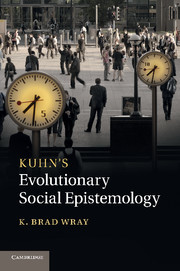Kuhn's Evolutionary Social Epistemology
Langue : Anglais
Auteur : Wray K. Brad

Defends Kuhn's evolutionary social epistemology and examines new directions in Kuhn's view on social constructionism and the sociology of science.
Kuhn's Structure of Scientific Revolutions (1962) has been enduringly influential in philosophy of science, challenging many common presuppositions about the nature of science and the growth of scientific knowledge. However, philosophers have misunderstood Kuhn's view, treating him as a relativist or social constructionist. In this book, Brad Wray argues that Kuhn provides a useful framework for developing an epistemology of science that takes account of the constructive role that social factors play in scientific inquiry. He examines the core concepts of Structure and explains the main characteristics of both Kuhn's evolutionary epistemology and his social epistemology, relating Structure to Kuhn's developed view presented in his later writings. The discussion includes analyses of the Copernican revolution in astronomy and the plate tectonics revolution in geology. The book will be useful for scholars working in science studies, sociologists and historians of science as well as philosophers of science.
List of figures and table; Acknowledgements; Introduction: Kuhn's insight; Part I. Revolutions, Paradigms, and Incommensurability: 1. Scientific revolutions as lexical changes; 2. The Copernican revolution revisited; 3. Kuhn and the discovery of paradigms; 4. The epistemic significance of incommensurability; Part II. Kuhn's Evolutionary Epistemology: 5. Kuhn's historical perspective; 6. Truth and the end of scientific inquiry; 7. Scientific specialization; 8. Taking stock of the evolutionary dimensions of Kuhn's epistemology; Part III. Kuhn's Social Epistemology: 9. Kuhn's constructionism; 10. What makes Kuhn's epistemology a social epistemology?; 11. How does a new theory come to be accepted?; 12. Where the road has taken us: a synthesis; Bibliography; Index.
K. Brad Wray is an Associate Professor of Philosophy at the State University of New York, Oswego. He has published extensively on the epistemology of science, Kuhn's philosophy of science and the anti-realism/realism debate. He was the guest editor of a special issue of the journal Episteme, on the theme of collective knowledge and science, and he is also the editor of an epistemology textbook, Knowledge and Inquiry (2002).
Date de parution : 03-2014
Ouvrage de 244 p.
15.2x22.9 cm
Disponible chez l'éditeur (délai d'approvisionnement : 14 jours).
Prix indicatif 49,66 €
Ajouter au panierDate de parution : 09-2011
Ouvrage de 244 p.
15.2x22.9 cm
Disponible chez l'éditeur (délai d'approvisionnement : 14 jours).
Prix indicatif 93,25 €
Ajouter au panierThème de Kuhn's Evolutionary Social Epistemology :
© 2024 LAVOISIER S.A.S.



